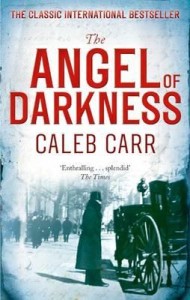Included below is The Angel of Darkness summary as well as selected critical reception. For a timeline and complete series of events of The Angel of Darkness, or to test your knowledge about The Angel of Darkness’s story and characters in a quiz, please use the menu.
The Angel of Darkness Summary
17th Street’s Blurb
On the eve of the Spanish-American war with tensions between the two countries at their peak, the daughter of a Spanish diplomat is kidnapped in Central Park while on an outing with her mother. Upon being presented with the case at her newly opened private investigation firm, former police secretary Miss Sara Howard is aware of the potentially volatile political implications of the case and enlists the help of her former colleagues in the sensitive investigation.
In the days that follow, the investigative team, led one again by eminent psychologist Dr. Laszlo Kreizler, discover that the heart of this case lies far from politics and instead rests with a mysterious woman whose dark past draws them away from Manhattan to the small town of Ballston Spa in upstate New York. With legendary attorney Clarence Darrow cast to defend the suspect’s case, The Angel of Darkness is part mystery, part courtroom drama, and part psychological thriller–and pits the team against their most frightening and cunning adversary yet.
As with its predecessor, The Angel of Darkness conjures up New York City and the surrounding New York state as a land of stark contrasts, where Gilded Age wealth and privilege is located only streets away from the poorest slums and tenements. However, unlike The Alienist, this novel focuses on the feminine, examining the what drives mothers to kill, how poverty can drive young girls to make unthinkable decisions, and why society would prefer not to acknowledge that such things can and do happen.
The Angel of Darkness Critical Reception
Sequels usually don’t work, but in The Angel of Darkness, Caleb Carr has written at least as winning a historical thriller as his best seller The Alienist. Once again, he has created a turn-of-the-century New York City that feels as authentic as a fading tintype…
Best of all, the theme of The Angel of Darkness is both historically accurate and contemporary, concerning as it does the social pressure on women to be mothers and what happens to their psyches when they lack the instinct to nurture.
Suspenseful… Through the observations, discoveries, and confusions of his idiosyncratic detective squad, Carr deftly scrutinizes ‘the secret sins of American society’ and the perpetual proposition that the greatest mystery is the human mind.
Carr is at his strongest, exploring the dark underside of the human psyche and ferreting out the terrors and tragedies that drive men — and women — to kill… In Libby Hatch, Carr has created a villain whose cunning is nearly equal to his detectives’ crime-solving prowess… The mystery is plotted with military precision.
Time:
Fascinating… Good courtroom drama… In a brilliant bit of historical casting, Clarence Darrow, a rising courtroom wizard from Chicago, turns up to defend the villain at a tense upstate New York murder trial.
The Wall Street Journal:
[An] adept mixture of period detail and psychological sleuthing… Filled with enough outsized personalities and sensational events to keep the most jaded tabloid reader eagerly turning its pages.
Here’s New York circa 1897, city of unparalleled corruption and splendor, city of fine dining and seedy taverns… Few writers are as adept [as Carr] at fashioning revelations that detonate, chapter by chapter, like carefully positioned explosions.

